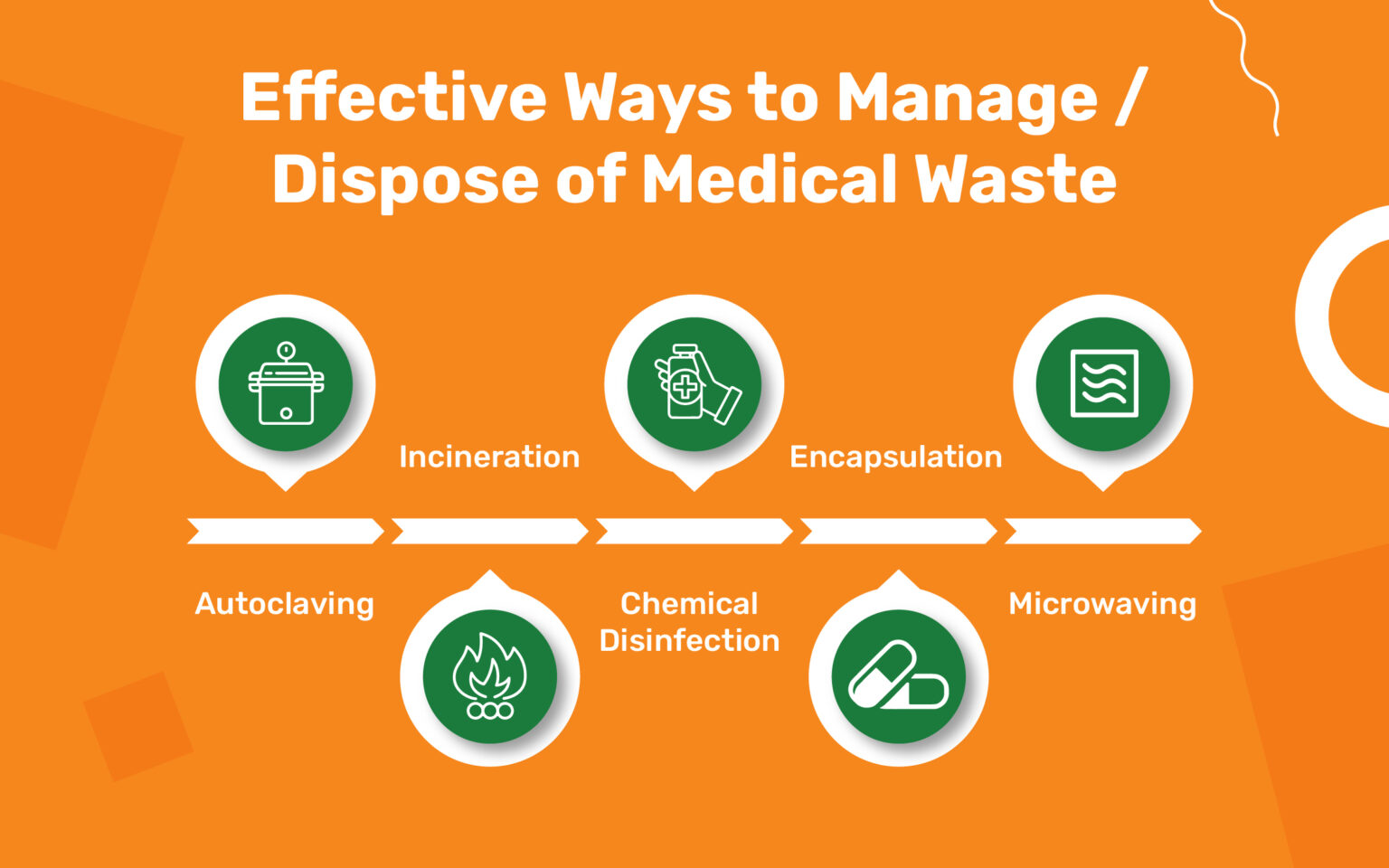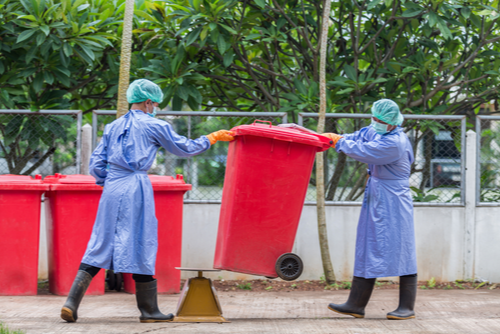Defending Health: Introducing the Significance of Specialist Medical Waste Removal
Wiki Article
Keep Compliant and Safe: Just How to Take Care Of Medical Waste Correctly
In today's ever-changing medical care landscape, ensuring compliance and safety when it comes to clinical waste disposal is of utmost relevance. In this discussion, we will check out the different types of medical waste, the connected dangers, the legal needs, and the ideal methods for preserving a risk-free and compliant medical waste administration system.Value of Appropriate Medical Waste Disposal
Correct medical garbage disposal is of utmost relevance in making sure the safety and health of both health care employees and the public. Clinical waste, that includes items such as utilized needles, infected dressings, and ended drugs, positions major wellness threats otherwise handled and dealt with properly.
Moreover, incorrect disposal of clinical waste can cause environmental contamination. When medical waste is not set apart, dealt with, or disposed of properly, it can find its way into land fills or bodies of water, possibly polluting the water, air, or soil resources. This can have damaging impacts on ecosystems and human wellness, as harmful compounds might leach right into the environment or be released into the atmosphere.
Kinds Of Clinical Waste and Their Dangers
The varied variety of medical waste created by health care facilities provides various threats that should be carefully resolved to make certain appropriate disposal and protect against prospective injury to public health and wellness and the environment. Medical waste can be identified into different categories based on its characteristics and degree of threat.One kind of clinical waste is infectious waste, that includes items that are contaminated with blood or various other possibly contagious materials. This can consist of used needles, syringes, and other sharp things, as well as cells, swabs, and dressings from patients with contagious conditions. Inappropriate disposal of infectious waste can cause the transmission of dangerous microorganisms and the spread of infections.
An additional category is dangerous waste, that includes products that are harmful, combustible, corrosive, or reactive. This can consist of chemicals, drugs, and particular medical gadgets. Messing up or inappropriate disposal of contaminated materials can result in ecological contamination and posture risks to the health and wellness of waste employees and the basic public.
Contaminated waste is an additional kind of medical waste that have to be carefully handled. This waste includes materials which contain contaminated materials, such as made use of radiation therapy sources or polluted lab materials. Inappropriate handling or disposal of contaminated waste can bring about radiation direct exposure and serious health risks.
Lastly, non-hazardous general waste, such as paper, packaging materials, and food waste, is also generated by healthcare facilities. While this waste may not pose substantial threats, it still needs to be effectively taken care of to preserve tidiness and stop the tourist attraction of insects.
To guarantee the safe disposal of medical waste, healthcare facilities must implement correct partition, storage space, therapy, and transportation techniques. This includes making use of proper containers, labeling, and training for personnel, as well as abiding by neighborhood policies and guidelines. By attending to the risks related to various types of clinical waste, healthcare centers can shield public health and wellness and the environment.
Lawful and Regulative Requirements for Disposal
In order to make certain the risk-free and proper disposal of clinical waste, healthcare centers should abide by legal and regulative demands. These needs are in area to secure public health and the setting from the prospective threats related to clinical waste. Medical waste is identified as a special classification of waste due to its prospective to transmit contagious diseases and have dangerous substances.
Some typical needs include the segregation and appropriate packaging of clinical waste, the usage of approved containers and labels, and the application of risk-free handling and transport treatments - medical waste removal. Health care facilities may likewise be needed to keep documents of their waste administration techniques and give documents to regulatory authorities upon demand
Failure to adhere to these legal and regulatory needs can cause fines, penalties, and reputational damages for medical care centers. It is, as a result, crucial for medical care service providers to prioritize compliance and establish durable waste monitoring methods to ensure the safe and proper disposal of medical waste.
Ideal Practices for Safe Medical Waste Monitoring
Medical care centers should follow industry best techniques to make sure the risk-free and efficient monitoring of clinical waste - medical waste disposal services with WasteX. Implementing these finest techniques not only aids safeguard the environment and public health and wellness yet likewise lowers the risk of possible legal and monetary effectsOne of the key ideal practices is the appropriate partition and containment of different kinds of clinical waste. This involves utilizing color-coded containers and plainly labeling them to ensure that each type of waste is disposed of properly. In addition, healthcare facilities must have marked locations for storage and disposal of medical waste, with clear standards and treatments in place.
An additional important aspect of risk-free clinical waste monitoring is the training and education of healthcare personnel. All personnel who manage clinical waste should receive extensive training on the appropriate handling, storage space, and disposal treatments. It is crucial to ensure that team member understand the possible threats related to clinical waste and are outfitted with the necessary knowledge and skills to manage it securely.
Normal tracking and bookkeeping of waste administration methods is likewise necessary. This entails consistently reviewing waste monitoring treatments, performing examinations, and preserving precise records. By medical waste disposal services with WasteX keeping an eye on waste administration practices, healthcare centers can recognize any type of prospective issues or areas for renovation and take restorative actions accordingly.
Last but not least, medical care centers ought to prioritize the usage of eco-friendly disposal methods whenever possible. This includes using waste treatment technologies such as autoclaving or incineration, which can help in reducing the volume and unsafe nature of clinical waste.
Eco-Friendly Solutions for Medical Waste Disposal
Applying green services for medical garbage disposal is important for healthcare centers to reduce ecological effect and ensure lasting practices. Typical techniques of clinical waste disposal, such as incineration and landfilling, have actually been discovered to launch damaging pollutants into the air and infect soil and water resources. As a result, there is an expanding demand for different approaches that are both eco friendly and secure.One environmentally friendly remedy is the application of on-site waste therapy systems. These systems use innovative technologies to securely refine medical waste within the health care center itself. By treating the waste on-site, transportation exhausts and risks connected with off-site disposal are lowered. Additionally, these systems usually employ sophisticated sanitation strategies, such as steam or microwave treatment, to ensure the full destruction of contagious microorganisms.
Another environment-friendly strategy is the fostering of reusing programs for certain sorts of medical waste. Products such as glass, plastics, and useful reference metals can be recycled as opposed to disposed of in landfills. By executing segregation and recycling programs, healthcare facilities can considerably decrease their waste volume and reduce their ecological impact.
Furthermore, medical care centers can discover using multiple-use clinical devices and products. By going with recyclable products, instead than single-use options, the amount of waste generated is considerably decreased. Reusable medical waste disposal services with WasteX items can be sanitized and used multiple times, causing price financial savings and less environmental influence.
Verdict
In verdict, appropriate disposal of medical waste is crucial for keeping conformity and guaranteeing safety. Understanding the kinds of medical waste and their associated threats is essential in order to execute the ideal disposal approaches. Adhering to lawful and regulative demands is essential for staying clear of charges and protecting the setting. Following ideal methods for secure medical waste monitoring and checking out environmentally friendly remedies can add to a lasting and accountable strategy to garbage disposal in the medical care industry.
In this conversation, we will certainly explore the different kinds of clinical waste, the associated dangers, the lawful needs, and the best practices for preserving a secure and certified medical waste monitoring system - medical waste removal near me.One type of medical waste is infectious waste, which includes products that are infected with blood or various other possibly transmittable materials.Contaminated waste is one more kind of clinical waste that must be thoroughly handled. Medical waste is categorized as an unique classification of waste due to its potential to transmit contagious illness and consist of unsafe materials
Adhering to ideal techniques for secure clinical waste monitoring and discovering green solutions can contribute to a liable and lasting strategy to lose disposal in the health care market. medical waste disposal services with WasteX.
Report this wiki page